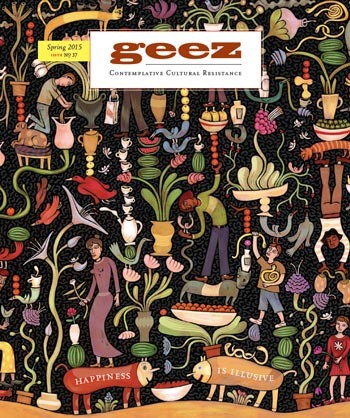Let’s Examine the Happiness Script

Credit: Farrukh, https://www.flickr.com/photos/swamibu/1352354517
Of course I want people to be happy.
That’s why I wanted to do an issue of Geez on happiness. But I’ve discovered that my wish for others might actually be a problem. My wish for the good life could simply be whatever I’ve been socialized to think is good.
For example: I used to like driving cars, and I thought owning a sports car would make me happy. I like smooth roads, they make me happy. I like the comfort of biting into a soft ice-cream cone dipped in chocolate. I feel fulfilled in a monogamous, heterosexual relationship, and I feel secure holding the title to some property, with grass and a deck.
Happiness is good, but the happiness script may be oppressive. If it is written by the usual directors of North American life (profit-seekers, war-condoners, resource-depleters, free-marketeers, European descendants) then the prevailing definition of happiness may mean sorrow for people who are not male, heterosexual, upwardly mobile, white, or those who self-identify with a gender other than what’s between their legs.
Feminist killjoy
I get these ideas from listening to feminist women and critical theorists. Sara Ahmed, a philosopher and a queer woman of colour, calls herself a “feminist killjoy,” a role she embraces. The killjoy disrupts the happiness of others when that happiness solidifies the oppression of those in subdominant groups.
If I’m having beers with my friends, which often means other white men, and one of the guys says something I think might be racist, sexist or homophobic, what do I do? If I talk about it, I may not be invited to the next gathering. Even though they may agree with me, they don’t always want their happiness disrupted. Who wants to invite a killjoy to the party? We would do so out of obligation or gracious tolerance, but probably not out of a desire to hear a transformative word of the social gospel.
Source of liberation
And yet this is precisely a likely source of a liberating word. In her book, The Promise of Happiness, Sara Ahmed introduces the notions of an “affect alien.” This is a person who feels out of sync with what’s happening in a roomful of people, workplace culture, study group, family table, and so on. “The affect alien is the one who converts good feelings into bad, who as it were ‘kills’ the joy of the family.”
She explores at length the important roles of “feminist killjoys,” “unhappy queers,” and “melancholic migrants.” In terms of capitalist, heteronormative, white, family values, each of these people are downers.
Donny Downer? Not me
Who wants to be a Debby or Donny Downer? Not me. And yet, the killjoy bears hope. Problematic happiness can be identified, disrupted, and re-directed – maybe even transformed.
I doubt the merits of the pursuit of happiness. If we encourage it, maybe we’ll end up promoting Reagan-era market policies, McCarthy-era xenophobias, Martha-Stewart-era bourgeois (or class neutral) aesthetics, Amazon-Ikea-era consumerism, and Apple-era alienation from our land base. To be safe, I guess I prefer the role of killjoy.
Yet I still want to celebrate happiness.
Love, persecution, rejoice
So, with self-doubt I proceed. Didn’t Jesus say, “blessed are you when you mourn,” and “blessed are you when you are persecuted”? In my mind, he’s a positive killjoy. When you are aware of suffering in your midst, stop and listen to the pain. When you pursue love, peace, justice and freedom, and then encounter persecution, you can rejoice because you’re doing the right thing. This is counterintuitive and doesn’t make for sexy movies or TV series.
When you become the Good Samaritan – an outcast who comes to the aid of a stranger in need – you become an agent of love and hope. At best, you become a class-conscious conduit of joy, an evermore, racially-aware presence of gratitude, a deep connection to the flourishing of others, with a preferential bias for the weak and downtrodden.
Flourishing may be a better word to describe “happiness.” It’s both a mood and an action; it’s individual and collective.
If you have any questions or comments about this editorial, please consider writing a letter to the editor for the next issue of Geez magazine (see the Contact Us page here), or adding your comment below. – Aiden Enns, Editor, Geez magazine



Sorry, comments are closed.